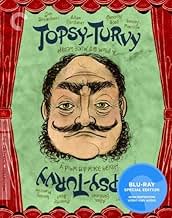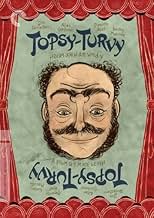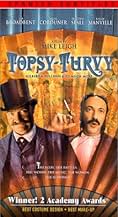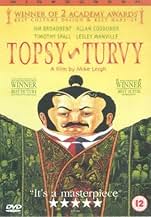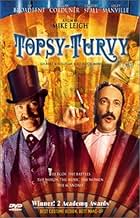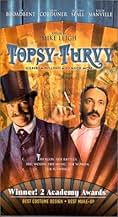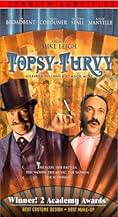CALIFICACIÓN DE IMDb
7.3/10
14 k
TU CALIFICACIÓN
En los 1880, Gilbert y Sullivan, famosos escritores de teatro musical, enfrentan una crisis creativa que amenaza su colaboración. Justo cuando parece que todo está perdido, encuentran inspir... Leer todoEn los 1880, Gilbert y Sullivan, famosos escritores de teatro musical, enfrentan una crisis creativa que amenaza su colaboración. Justo cuando parece que todo está perdido, encuentran inspiración para crear su obra maestra: El Mikado.En los 1880, Gilbert y Sullivan, famosos escritores de teatro musical, enfrentan una crisis creativa que amenaza su colaboración. Justo cuando parece que todo está perdido, encuentran inspiración para crear su obra maestra: El Mikado.
- Dirección
- Guionista
- Elenco
- Ganó 2 premios Óscar
- 13 premios ganados y 28 nominaciones en total
Bill Neenan
- Cook
- (as William Neenan)
- Dirección
- Guionista
- Todo el elenco y el equipo
- Producción, taquilla y más en IMDbPro
Opiniones destacadas
I am a violinist who has done a lot of theater shows and have seen lots of theater rehearsal.
For me this film has everything - the scenery is more lavish and beautiful than I've ever witnessed anywhere. For me, the interest _is_ the behind-the-scenes view of the actors. The fact that Allan Corduner (Sullivan) is actually a musician (not just miming the piano work) is a real plus. The scene of the recital of his "Lost Chord" was a marvelous musical moment. It captured the atmosphere of an old-style home recital, with earnest artists and elegant surroundings. And the rehearsal scene with the trio Grossmith (Koko), Barrington (Poo-bah), and Beauville each singing why they can't chop their own heads off is a marvelous view of what rehearsal can and should be like. Everyone has learned their words but now we're refining the artistry. The director assumes the viewer is well versed and doesn't beat him over the head. I feel honored that I am being treated as an intelligent watcher. When Gilbert says to Beauville, "I've gone to great length to give you triplets..... so let's do it again and let's ....'trip'", and they do, and it really works, I get the feeling that they live in and understand my world. Every moment of the film has for me a beauty.
The snippets of the other G&S operettas are astounding. The wake-up scene in The Sorcerer is probably only a minute long, but each word and glance is well chosen, and everyone is in perfect character. Like the cliché, "Every bride is beautiful.", every man and woman in this cast is beautiful.
Another remarkable moment in the film is Temple's "Mikado Song" when he dances, and the aftermath where Gilbert cuts the number and it then gets reinstated by the chorus men and women cornering Gilbert in the stairwell. My experience is that people in theater really do care for each other and they wish each other well. When someone does something of artistic merit, they know it, and want it to be displayed.
Almost every moment of this film rings true to me as a musician, and I treasure it. I can start this video at any random spot on the tape and find something to enjoy for 10 seconds or for another hour.
Because much of the film centers around Mikado, anyone who has ever worked on Mikado as an actor, crew, or musician will find much to enjoy. For someone who is not at all familiar with that operetta, I could understand them feeling that they can't see the continuity-- because the director has chosen not to repeat things. You will see this part and that part in preliminary stages of rehearsal but not again later, so if you saw the behind the scenes work, you won't see the 'finished product' except in the case of "Three Little Maids."
I was left wishing that this cast actually had created a full length version of Mikado, but alas I don't believe they did; all this work was for the sake of this film and it's not a documentary of an actual living repertory group.
For me this film has everything - the scenery is more lavish and beautiful than I've ever witnessed anywhere. For me, the interest _is_ the behind-the-scenes view of the actors. The fact that Allan Corduner (Sullivan) is actually a musician (not just miming the piano work) is a real plus. The scene of the recital of his "Lost Chord" was a marvelous musical moment. It captured the atmosphere of an old-style home recital, with earnest artists and elegant surroundings. And the rehearsal scene with the trio Grossmith (Koko), Barrington (Poo-bah), and Beauville each singing why they can't chop their own heads off is a marvelous view of what rehearsal can and should be like. Everyone has learned their words but now we're refining the artistry. The director assumes the viewer is well versed and doesn't beat him over the head. I feel honored that I am being treated as an intelligent watcher. When Gilbert says to Beauville, "I've gone to great length to give you triplets..... so let's do it again and let's ....'trip'", and they do, and it really works, I get the feeling that they live in and understand my world. Every moment of the film has for me a beauty.
The snippets of the other G&S operettas are astounding. The wake-up scene in The Sorcerer is probably only a minute long, but each word and glance is well chosen, and everyone is in perfect character. Like the cliché, "Every bride is beautiful.", every man and woman in this cast is beautiful.
Another remarkable moment in the film is Temple's "Mikado Song" when he dances, and the aftermath where Gilbert cuts the number and it then gets reinstated by the chorus men and women cornering Gilbert in the stairwell. My experience is that people in theater really do care for each other and they wish each other well. When someone does something of artistic merit, they know it, and want it to be displayed.
Almost every moment of this film rings true to me as a musician, and I treasure it. I can start this video at any random spot on the tape and find something to enjoy for 10 seconds or for another hour.
Because much of the film centers around Mikado, anyone who has ever worked on Mikado as an actor, crew, or musician will find much to enjoy. For someone who is not at all familiar with that operetta, I could understand them feeling that they can't see the continuity-- because the director has chosen not to repeat things. You will see this part and that part in preliminary stages of rehearsal but not again later, so if you saw the behind the scenes work, you won't see the 'finished product' except in the case of "Three Little Maids."
I was left wishing that this cast actually had created a full length version of Mikado, but alas I don't believe they did; all this work was for the sake of this film and it's not a documentary of an actual living repertory group.
10Tom-207
I was introduced to Gilbert & Sullivan in my very early teens under the auspices of the parents of one of my friends. They took us to Falmouth on Cape Cod to a place called Highfield, the summer home of the Oberlin College Players. They specialized in G&S and other light operettas.
I learned to appreciate G&S, but I never became a fanatical devotee, even with the historical context patiently explained to me by my friend's mom. (It was similar with Shakespeare. The language could be a barrier rather than a gateway.)
The audience in the theater where I saw Topsy-Turvy was filled with devotees. You could hear their delight as they viewed the actual performances of Gilbert & Sullivan's work in the film. The director, Mike Leigh, through skillful editing and camera work, does an excellent job of photographing a stage presentation, certainly one of the best I've ever seen on film. He uses closeups, and though the actors are using an exaggerated, theatrical style, somehow the G&S material has never been clearer to me; and I've seen at least a dozen G&S performances, including two D'Oyle Carte productions (Pirates and The Mikado), the present-day descendant company of the Savoy Theater depicted in the film. People who have never seen G&S before will appreciate their work here.
Most of all, the film is very much about the highly contrasting personalities of William S. Gilbert and Sir Arthur Sullivan, the former emotionally restrained, the latter a hedonist. Leigh allows us to get to know them quite well and a host of other characters too, though G&S are first among equals in this excellent, ensemble cast. Among the supporting players, I found Shirley Henderson to be increasingly interesting as the film progressed, and I felt rewarded when she was the central character in the last two scenes of the film.
The period settings, manners, and speech are very accurate and detailed. As presented here, the Victorian era seems physically stifling, with people leading their lives in the close quarters of dressing rooms, offices, restaurants, living rooms, and bedrooms. Even more stifling is the emotional inhibition masked by correctly blustery forthrightness. Toward the end of the film, there's a revealing and poignant scene between Gilbert and his wife which makes this all very clear, and what also becomes clear is how important theatrical presentations were to people then as a means of expressing themselves in a culture which sanctioned few quarters to do so. It's one of the best examples of Mike Leigh's direction.
The G&S operettas were, of course, a commentary on Victorian times. In the film, you can see why they were so wildly popular. In that period, I think so many people were so restrained and distant from their own feelings that even the, to us, mannered and wordy G&S operettas were a breath of fresh air in Victorian England. The few occasions when Leigh breaks out of consistently claustrophobic medium shots and closeups are when he gives us a wide view of the full, theatrical stage.
Topsy-Turvy is about how Gilbert and Sullivan refracted Victorian England through a proscenium arch. Mike Leigh refracts it again through the camera lens in a way that allows us to see ourselves in our times by looking at G&S and their operettas in theirs. This is a long film (over two and one half hours), and given the subject matter, not to everyone's interest, though it's far more than the specifics of the period and the material. I found it to be my favorite film of the year thus far, and I highly recommend it.
I learned to appreciate G&S, but I never became a fanatical devotee, even with the historical context patiently explained to me by my friend's mom. (It was similar with Shakespeare. The language could be a barrier rather than a gateway.)
The audience in the theater where I saw Topsy-Turvy was filled with devotees. You could hear their delight as they viewed the actual performances of Gilbert & Sullivan's work in the film. The director, Mike Leigh, through skillful editing and camera work, does an excellent job of photographing a stage presentation, certainly one of the best I've ever seen on film. He uses closeups, and though the actors are using an exaggerated, theatrical style, somehow the G&S material has never been clearer to me; and I've seen at least a dozen G&S performances, including two D'Oyle Carte productions (Pirates and The Mikado), the present-day descendant company of the Savoy Theater depicted in the film. People who have never seen G&S before will appreciate their work here.
Most of all, the film is very much about the highly contrasting personalities of William S. Gilbert and Sir Arthur Sullivan, the former emotionally restrained, the latter a hedonist. Leigh allows us to get to know them quite well and a host of other characters too, though G&S are first among equals in this excellent, ensemble cast. Among the supporting players, I found Shirley Henderson to be increasingly interesting as the film progressed, and I felt rewarded when she was the central character in the last two scenes of the film.
The period settings, manners, and speech are very accurate and detailed. As presented here, the Victorian era seems physically stifling, with people leading their lives in the close quarters of dressing rooms, offices, restaurants, living rooms, and bedrooms. Even more stifling is the emotional inhibition masked by correctly blustery forthrightness. Toward the end of the film, there's a revealing and poignant scene between Gilbert and his wife which makes this all very clear, and what also becomes clear is how important theatrical presentations were to people then as a means of expressing themselves in a culture which sanctioned few quarters to do so. It's one of the best examples of Mike Leigh's direction.
The G&S operettas were, of course, a commentary on Victorian times. In the film, you can see why they were so wildly popular. In that period, I think so many people were so restrained and distant from their own feelings that even the, to us, mannered and wordy G&S operettas were a breath of fresh air in Victorian England. The few occasions when Leigh breaks out of consistently claustrophobic medium shots and closeups are when he gives us a wide view of the full, theatrical stage.
Topsy-Turvy is about how Gilbert and Sullivan refracted Victorian England through a proscenium arch. Mike Leigh refracts it again through the camera lens in a way that allows us to see ourselves in our times by looking at G&S and their operettas in theirs. This is a long film (over two and one half hours), and given the subject matter, not to everyone's interest, though it's far more than the specifics of the period and the material. I found it to be my favorite film of the year thus far, and I highly recommend it.
Not being a big fan of opera (of the comedic variety or otherwise), I chose to watch this movie as a period piece, hoping to see a lot of eccentric characters putting on even more eccentric theatre. That was easy, since the trailer for the film points in that direction entirely.
What I didn't expect was a thoroughly entrancing inside view of the Victorian theatre. Not to mention comprehensive. Everyone is covered in this - from the stage boy through the chorus through the leads and producers and assistant directors. The telling of the complex relationships between the directors (Gilbert and Sullivan) and the leads is particularly poignant - whether dealing with the actors' considerable egos or their individual popularity among the chorus, nothing presented doesn't ring true.
I loved everything about this movie. It's a great story, told wonderfully by all involved. It is truly a film of much love and craft.
And I expect I'll be attending the next run of the Mikado next time it comes to town.
What I didn't expect was a thoroughly entrancing inside view of the Victorian theatre. Not to mention comprehensive. Everyone is covered in this - from the stage boy through the chorus through the leads and producers and assistant directors. The telling of the complex relationships between the directors (Gilbert and Sullivan) and the leads is particularly poignant - whether dealing with the actors' considerable egos or their individual popularity among the chorus, nothing presented doesn't ring true.
I loved everything about this movie. It's a great story, told wonderfully by all involved. It is truly a film of much love and craft.
And I expect I'll be attending the next run of the Mikado next time it comes to town.
Gilbert and Sullivan are a successful musical team writing their shows for the Savoy Hotel in London. However Sullivan is tired and is suffering from ill-health. During a bad bout he resolves to no longer write for the Savoy with Gilbert but instead to recover in France and then to strike out alone and write a grand opera. Gilbert meanwhile, is showing signs of fatigue coming up with plots that use the same devices to the same ends. However the two are contractually obliged to continue their relationship, a prospect both seem ill at ease with until Gilbert takes an afternoon off at an exhibition of Japanese culture, sowing the seeds of inspiration for The Mikado.
I honestly had never even heard of this film until the television premier in 2002, if you had told me Mike Leigh had made a film on such subject matter I would likely have laughed down my sleeve at such a suggestion. However I gave this a watch despite the fact I know little (or care little) for the works of Gilbert and Sullivan and worries bout the fact it was 160 odd minutes long! However the plot is sufficiently well delivered to take those who only know a little about the pair to keep up. By taking the snapshot of the Mikado to show their relationship the film takes away what could have been a rough, sprawling epic the snapshot works much better. The weaving of the production into the narrative, rather than all at the end, means that both sets of fans will be happy there is enough music to please those who came for that, but also enough plot within to drive the film.
Leigh does very well, mixing humour and telling drama with the music of the show. The production of the film (and the production!) are both very good and the detail is fine. The cast are all excellent. Broadbent is good as the straight-laced Gilbert and his chemistry with the enjoyable Corduner works throughout. The support cast are all good in singing and non-singing scenes I was surprised to see Spall carrying the tunes so well!
Overall this is a good film but I doubt that Gilbert & Sullivan will be much of a draw even now that it is on TV. However if you have the chance to watch it then you should push through your reservations and give it a try it is engaging and humourous enough to overcome a lack of knowledge (or interest) in the pair's work.
I honestly had never even heard of this film until the television premier in 2002, if you had told me Mike Leigh had made a film on such subject matter I would likely have laughed down my sleeve at such a suggestion. However I gave this a watch despite the fact I know little (or care little) for the works of Gilbert and Sullivan and worries bout the fact it was 160 odd minutes long! However the plot is sufficiently well delivered to take those who only know a little about the pair to keep up. By taking the snapshot of the Mikado to show their relationship the film takes away what could have been a rough, sprawling epic the snapshot works much better. The weaving of the production into the narrative, rather than all at the end, means that both sets of fans will be happy there is enough music to please those who came for that, but also enough plot within to drive the film.
Leigh does very well, mixing humour and telling drama with the music of the show. The production of the film (and the production!) are both very good and the detail is fine. The cast are all excellent. Broadbent is good as the straight-laced Gilbert and his chemistry with the enjoyable Corduner works throughout. The support cast are all good in singing and non-singing scenes I was surprised to see Spall carrying the tunes so well!
Overall this is a good film but I doubt that Gilbert & Sullivan will be much of a draw even now that it is on TV. However if you have the chance to watch it then you should push through your reservations and give it a try it is engaging and humourous enough to overcome a lack of knowledge (or interest) in the pair's work.
10markt-9
I loved this film, yet I have a hard time understanding many of the comments other viewers have made. I never liked G&S all that much, thought they were rather light weight stuff. Never liked the late Victorian era much either. Kind of a dull time, I thought. Musicals are definitely not my thing.
Yet this movie struck me as one of the greatest I have ever seen, right up there with Greed and Citizen Kane and all that lot. I suppose it's because I like period pieces, and I think it's damned difficult for anyone to draw an accurate -- or even an evocative -- picture of any time that is not their own. This movie does that, and it never even appears to strain so much as a single hair to do so.
In the end, this movie is deeply *humane.* Like many another Mike Leigh epic, the characters here are drawn in the round, flaws and talents all on view, just like real human beings. And he likes them all, even the stinkers. Likes them well enough to paint them as they are, not as cardboard figures.
If you like your characters pre-digested and redrawn larger than life and your plots full of twists and turns, you might find this movie tame. If you like people, you'll find it fascinating, funny, and true as gold.
And why do I rate it so highly? Because it hangs together so perfectly, all of a piece. It's luscious to look at, delightful to hear, and sweet as candy without ever once becoming saccharine or cheap.
Some reviewers complained you had to "already know" something to enjoy this movie: the music, the time, the language, the whatever. I say, all you have to know is human beings. If you find them interesting, you'll love this movie.
Yet this movie struck me as one of the greatest I have ever seen, right up there with Greed and Citizen Kane and all that lot. I suppose it's because I like period pieces, and I think it's damned difficult for anyone to draw an accurate -- or even an evocative -- picture of any time that is not their own. This movie does that, and it never even appears to strain so much as a single hair to do so.
In the end, this movie is deeply *humane.* Like many another Mike Leigh epic, the characters here are drawn in the round, flaws and talents all on view, just like real human beings. And he likes them all, even the stinkers. Likes them well enough to paint them as they are, not as cardboard figures.
If you like your characters pre-digested and redrawn larger than life and your plots full of twists and turns, you might find this movie tame. If you like people, you'll find it fascinating, funny, and true as gold.
And why do I rate it so highly? Because it hangs together so perfectly, all of a piece. It's luscious to look at, delightful to hear, and sweet as candy without ever once becoming saccharine or cheap.
Some reviewers complained you had to "already know" something to enjoy this movie: the music, the time, the language, the whatever. I say, all you have to know is human beings. If you find them interesting, you'll love this movie.
¿Sabías que…?
- TriviaNot only did all the actors do their own singing, but everyone in the cast, including the pit orchestra and the actors who play instruments in the film, actually played the music they are seen to play.
- ErroresThis well known quote from the film is a factual mistake: "If you wish to write a Grand Opera about a prostitute, dying of consumption in a garret, I suggest you contact Mr Ibsen in Oslo. I am sure he will be able to furnish you with something suitably dull". The city of Oslo got the name in 1925 - a long time after Ibsen's death in 1906. During Ibsen's lifetime, the capital of Norway was called Kristiania.
- Citas
Helen Lenoir: The more I see of men, the more I admire dogs.
- Créditos curiososThe credit for "Location Vehicles" is misspelled "Location Vechicles".
- Bandas sonorasIf You Give Me Your Attention
from "Princess Ida"
Music by Arthur Sullivan
Lyrics by W.S. Gilbert
Performed by Martin Savage and Chorus
Selecciones populares
Inicia sesión para calificar y agrega a la lista de videos para obtener recomendaciones personalizadas
- How long is Topsy-Turvy?Con tecnología de Alexa
Detalles
- Fecha de lanzamiento
- Países de origen
- Idiomas
- También se conoce como
- Mike Leigh Untitled
- Locaciones de filmación
- Richmond Theatre, 1 Little Green, Richmond, Greater London, Inglaterra, Reino Unido(Savoy Theatre, London, England, UK)
- Productoras
- Ver más créditos de la compañía en IMDbPro
Taquilla
- Presupuesto
- GBP 10,000,000 (estimado)
- Total en EE. UU. y Canadá
- USD 6,208,548
- Fin de semana de estreno en EE. UU. y Canadá
- USD 31,387
- 19 dic 1999
- Total a nivel mundial
- USD 7,804,439
- Tiempo de ejecución2 horas 40 minutos
- Color
- Mezcla de sonido
- Relación de aspecto
- 1.66 : 1
Contribuir a esta página
Sugiere una edición o agrega el contenido que falta

Principales brechas de datos
By what name was Topsy-Turvy (1999) officially released in India in English?
Responda


